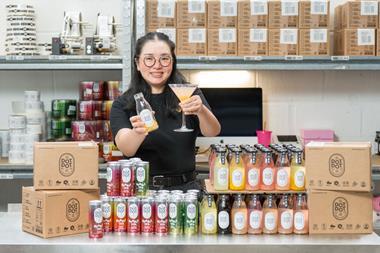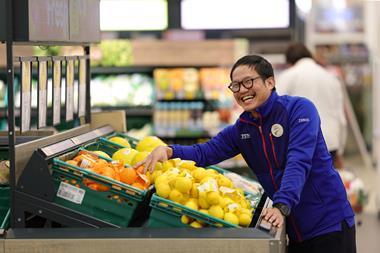A spate of factory closures suggests UK grocery manufacturing is in dire straits. Or does it? Beth Brooks reports
Less than two months into 2006 and the UK’s grocery manufacturing industry is already notching up a growing list of casualties: Leaf UK is considering whether to close its factory in Stockport; Elizabeth Shaw is shutting a plant in Bristol; Arla Foods UK is pulling out of a site at Uckfield; Richmond Foods is ending production in Bude; and Hill Station is shutting a site in Cheadle.
Add to this lengthening list of factory closures last year’s announcements of facility shutdowns by the likes of PZ Cussons, Masterfoods and Yoplait Dairy Crest, and it all makes for grim reading.
The stories behind these closures are all very different. But two common trends emerge. First, suppliers are being forced to step up the pace of consolidation as retailer power grows and that means more facilities are being rationalised. Second, production is being shifted offshore as grocery suppliers take advantage of lower-cost facilities.
In 2004, The Grocer identified these trends as massive threats to the UK’s manufacturing sector and we posed the question: is anyone safe? Two years later, things appear to be getting worse, if anything, as the pace of closures accelerates, begging a new, and even bleaker question: will UK food and drink production go the way of other manufacturing sectors?
Such a scenario is not as far-fetched as it may sound when you consider that many plants in Eastern Europe, Poland particularly, are just a 24-hour drive away from retailer RDCs in the UK. The traditional view that offshoring was an issue only for suppliers of ambient and frozen foods as well as non-food grocery items is looking increasingly outdated in the wake of recent closures.
Some experts believe that we ain’t seen nothing yet. Aidan Bocci, CEO at consultancy Commercial Advantage, is one who fears that the closures announced so far this year are just the beginning: “We are expecting more of this to happen. Manufacturers are facing the immediate pressure of rising utility costs so we will see a rise now, but it is an ongoing process.”
Luke Jensen, head of consumer practice for OC&C Strategy Consultants, agrees: “Manufacturers are facing increasing cost pressures from retailers so are having to manage production costs carefully and look at radical solutions to improve margins.”
Globalisation also plays its part, he says, particularly in some parts of the own label market where price is all. “An increasing number of retailers are conducting global e-auctions,” he says. “Companies are suddenly finding that they are up against Polish manufacturers, for example, and they can’t compete with their prices. It’s a case of: if you can’t beat them, join them.”
Bocci agrees, and adds: “Leaving the UK may provide a great opportunity to become a more responsive supplier to customers.”
Inter Link Foods is a case in point. The UK’s top supplier of own label cakes claims to be a fiercely proud British manufacturer and is investing heavily in its UK facilities. But since buying a Polish factory just over a year ago, it has more than doubled its turnover. The acquisition has allowed it to target new business areas here - as well as giving it a foothold in the Continental market, says Paul Griffiths, chief executive.
“You need to get the balance right. The UK is our home,” he says. “But if we found another business as good as Cukiernia Mistrza Jana it would make sense to grow through another acquisition - first to provide new products back to the UK and secondly to look at the 400 million European consumers.”
Inter Link is not alone in thinking big. But while it sees the Continent complementing UK production, others are adopting radical solutions and a more flexible approach to manufacturing as they face up to their challenges here. And that often means making decisions. Take Elizabeth Shaw, which is outsourcing production of its specialist confectionery lines instead of updating a 105-year-old factory.
If outsourcing, offshoring and flexible production strategies are all helping UK suppliers compete, we should not knock the benefits of factory consolidation either.
It’s another way to ride out the storm, says Neil Sutton, a PricewaterhouseCoopers partner. He says that consolidation not only allows manufacturers to benefit from cost savings, but can also free up funds for NPD, performance improvement and growth.
“Innovative suppliers with sufficient scale and high levels of customer service are well placed to survive in the current environment of supply base rationalisation,” he adds.
For own label ice cream maker Richmond Foods, the decision to close its Bude factory next month was an economic no-brainer.
A spokesman explains: “The site is geographically isolated from our three factories in the north of England and from the group’s main coldstore facilities in Yorkshire. Our margins are under constant pressure and we need to examine opportunities to consolidate production and utilise spare capacity at other sites.”
Hill Station’s recent decision to shut a factory in Cheadle, following the closure of one in Tattenhall, should actually be seen as a positive development for the business, says Charles Hall, MD. He says that the closures follow Hill Station’s acquisition last year of rival ice cream makers Loseley and Granelli.
He adds: “We knew Loseley had a new, large factory in Cwmbran that was heavily underutilised. Hill Station and Granelli’s factories had no room to expand so we decided to close the factories and transfer production.”
Hall is upbeat about Hill Station’s prospects: “Production is very viable in the UK and we would not be going through with this expansion if we did not think it was going to be successful. We are very enthusiastic about our prospects here.”
Any closure is bad news for workers - at least 700 jobs have been lost so far this year. But no matter how bad the headlines, we should remember that food, drink and tobacco is the UK’s top manufacturing sector, accounting for 14.2% of output, and is incredibly robust. Andrew Walton of National Statistics says: “Although a few well-publicised and fairly high-profile food manufacturers have closed factories in the past year, generally the sector is performing well.”
Figures released from National Statistics show that although the sector’s output remained unchanged for the quarter to December 31, it increased 1.4% last year as a whole on the back of an equally strong performance in 2004.
So will UK food and drink manufacturing go the way of other manufacturing sectors? Of course not. But expect more bad headlines, and casualties, as suppliers shape up to do business in a tougher climate.
Food to go
>>closures announced this year
Arla Foods UK
Factory location: Uckfield, East Sussex
Closing: later this year
Reason: consolidating facilities
Elizabeth Shaw
Factory location: Bristol
Closing: autumn 2006
Reason: outsourcing production
Hill Station
Factory location: Cheadle, Cheshire
Closing: within six months
Reason: rationalisation of facilities
Leaf UK
Factory location: Southport, Merseyside
Closing: under consultation
Reason: plans to offshore production
Richmond Foods
Factory location: Bude, Cornwall
Closing: March 10
Reason: consolidating facilities
Analysis
Less than two months into 2006 and the UK’s grocery manufacturing industry is already notching up a growing list of casualties: Leaf UK is considering whether to close its factory in Stockport; Elizabeth Shaw is shutting a plant in Bristol; Arla Foods UK is pulling out of a site at Uckfield; Richmond Foods is ending production in Bude; and Hill Station is shutting a site in Cheadle.
Add to this lengthening list of factory closures last year’s announcements of facility shutdowns by the likes of PZ Cussons, Masterfoods and Yoplait Dairy Crest, and it all makes for grim reading.
The stories behind these closures are all very different. But two common trends emerge. First, suppliers are being forced to step up the pace of consolidation as retailer power grows and that means more facilities are being rationalised. Second, production is being shifted offshore as grocery suppliers take advantage of lower-cost facilities.
In 2004, The Grocer identified these trends as massive threats to the UK’s manufacturing sector and we posed the question: is anyone safe? Two years later, things appear to be getting worse, if anything, as the pace of closures accelerates, begging a new, and even bleaker question: will UK food and drink production go the way of other manufacturing sectors?
Such a scenario is not as far-fetched as it may sound when you consider that many plants in Eastern Europe, Poland particularly, are just a 24-hour drive away from retailer RDCs in the UK. The traditional view that offshoring was an issue only for suppliers of ambient and frozen foods as well as non-food grocery items is looking increasingly outdated in the wake of recent closures.
Some experts believe that we ain’t seen nothing yet. Aidan Bocci, CEO at consultancy Commercial Advantage, is one who fears that the closures announced so far this year are just the beginning: “We are expecting more of this to happen. Manufacturers are facing the immediate pressure of rising utility costs so we will see a rise now, but it is an ongoing process.”
Luke Jensen, head of consumer practice for OC&C Strategy Consultants, agrees: “Manufacturers are facing increasing cost pressures from retailers so are having to manage production costs carefully and look at radical solutions to improve margins.”
Globalisation also plays its part, he says, particularly in some parts of the own label market where price is all. “An increasing number of retailers are conducting global e-auctions,” he says. “Companies are suddenly finding that they are up against Polish manufacturers, for example, and they can’t compete with their prices. It’s a case of: if you can’t beat them, join them.”
Bocci agrees, and adds: “Leaving the UK may provide a great opportunity to become a more responsive supplier to customers.”
Inter Link Foods is a case in point. The UK’s top supplier of own label cakes claims to be a fiercely proud British manufacturer and is investing heavily in its UK facilities. But since buying a Polish factory just over a year ago, it has more than doubled its turnover. The acquisition has allowed it to target new business areas here - as well as giving it a foothold in the Continental market, says Paul Griffiths, chief executive.
“You need to get the balance right. The UK is our home,” he says. “But if we found another business as good as Cukiernia Mistrza Jana it would make sense to grow through another acquisition - first to provide new products back to the UK and secondly to look at the 400 million European consumers.”
Inter Link is not alone in thinking big. But while it sees the Continent complementing UK production, others are adopting radical solutions and a more flexible approach to manufacturing as they face up to their challenges here. And that often means making decisions. Take Elizabeth Shaw, which is outsourcing production of its specialist confectionery lines instead of updating a 105-year-old factory.
If outsourcing, offshoring and flexible production strategies are all helping UK suppliers compete, we should not knock the benefits of factory consolidation either.
It’s another way to ride out the storm, says Neil Sutton, a PricewaterhouseCoopers partner. He says that consolidation not only allows manufacturers to benefit from cost savings, but can also free up funds for NPD, performance improvement and growth.
“Innovative suppliers with sufficient scale and high levels of customer service are well placed to survive in the current environment of supply base rationalisation,” he adds.
For own label ice cream maker Richmond Foods, the decision to close its Bude factory next month was an economic no-brainer.
A spokesman explains: “The site is geographically isolated from our three factories in the north of England and from the group’s main coldstore facilities in Yorkshire. Our margins are under constant pressure and we need to examine opportunities to consolidate production and utilise spare capacity at other sites.”
Hill Station’s recent decision to shut a factory in Cheadle, following the closure of one in Tattenhall, should actually be seen as a positive development for the business, says Charles Hall, MD. He says that the closures follow Hill Station’s acquisition last year of rival ice cream makers Loseley and Granelli.
He adds: “We knew Loseley had a new, large factory in Cwmbran that was heavily underutilised. Hill Station and Granelli’s factories had no room to expand so we decided to close the factories and transfer production.”
Hall is upbeat about Hill Station’s prospects: “Production is very viable in the UK and we would not be going through with this expansion if we did not think it was going to be successful. We are very enthusiastic about our prospects here.”
Any closure is bad news for workers - at least 700 jobs have been lost so far this year. But no matter how bad the headlines, we should remember that food, drink and tobacco is the UK’s top manufacturing sector, accounting for 14.2% of output, and is incredibly robust. Andrew Walton of National Statistics says: “Although a few well-publicised and fairly high-profile food manufacturers have closed factories in the past year, generally the sector is performing well.”
Figures released from National Statistics show that although the sector’s output remained unchanged for the quarter to December 31, it increased 1.4% last year as a whole on the back of an equally strong performance in 2004.
So will UK food and drink manufacturing go the way of other manufacturing sectors? Of course not. But expect more bad headlines, and casualties, as suppliers shape up to do business in a tougher climate.
Food to go
>>closures announced this year
Arla Foods UK
Factory location: Uckfield, East Sussex
Closing: later this year
Reason: consolidating facilities
Elizabeth Shaw
Factory location: Bristol
Closing: autumn 2006
Reason: outsourcing production
Hill Station
Factory location: Cheadle, Cheshire
Closing: within six months
Reason: rationalisation of facilities
Leaf UK
Factory location: Southport, Merseyside
Closing: under consultation
Reason: plans to offshore production
Richmond Foods
Factory location: Bude, Cornwall
Closing: March 10
Reason: consolidating facilities
Analysis

















No comments yet